A man wants to slide down a block of mass m which is kept on a fixed inclined plane of inclination 30∘ as shown in the figure .Initially the block is not sliding .
To just start sliding the man pushed the block down the inclined with a force F. Now , the block starts accelerating. To move it downwards with conatant speed the man starts pulling the block with same force. Surface are such that ratio of maximum static friction to kinetic friction is 2 Now, answer the following questions.
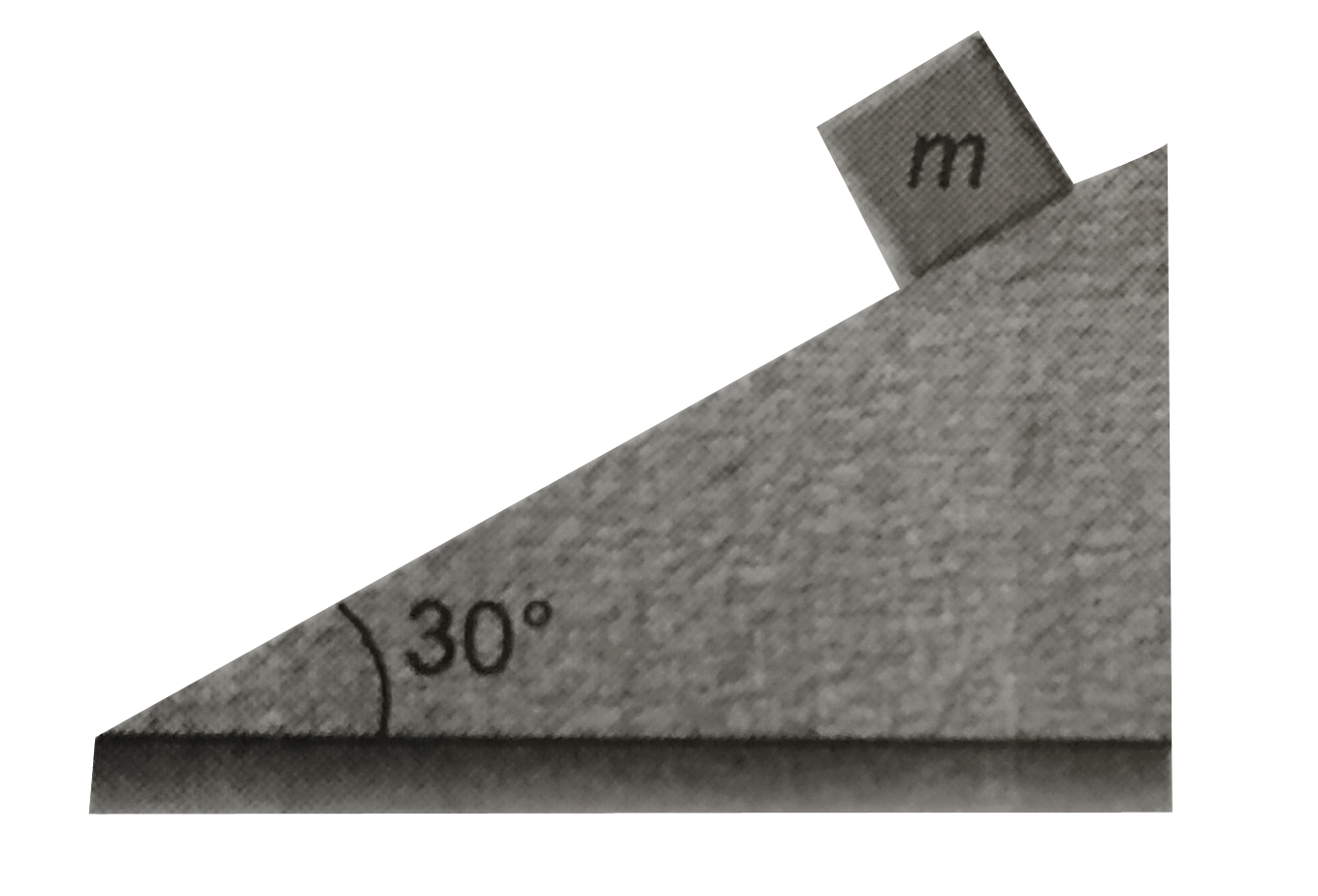
What is the value of F?
mg4
mg6
mg√34
mg2√3
The correct Answer is:B
Let μk=μ then μs=2μ
According to first condition, F+mgsinθ=μsmgcosθ=2μmgcosθ …(i)
According to second condition,
mgsinθ=F+μkmgcosθ
=F+μmgcosθ ...(ii)
Putting θ=30∘, we get
F+mg/2=2μmg(√32)
or √3μmg=F+0.5mg ...(iii)
mg2=F+μmg(√32)
or 0.5√3μmg=0.5mg−F ...(iv)
Driving Eq. (iii) and (iv) , we get
F=mg6
Topper's Solved these Questions
- LAWS OF MOTIONBook:DC PANDEYChapter:LAWS OF MOTIONExercise:Subjective Question
Explore 27 Videos
- LAWS OF MOTIONBook:DC PANDEYChapter:LAWS OF MOTIONExercise:example
Explore 86 Videos
- LAWS OF MOTIONBook:DC PANDEYChapter:LAWS OF MOTIONExercise:Objective Question
Explore 32 Videos
- KINEMATICS 1Book:DC PANDEYChapter:KINEMATICS 1Exercise:INTEGER_TYPE
Explore 15 Videos
- LAWS OF THERMODYNAMICSBook:DC PANDEYChapter:LAWS OF THERMODYNAMICSExercise:Level 2 Subjective
Explore 18 Videos
Similar Questions
A man wants to slide down a block of mass m which is kept on a fixed inclined plane of inclination 30∘ as shown in the figure .Initially the block is not sliding .
To just start sliding the man pushed the block down the inclined with a force F. Now , the block starts accelerating. To move it downwards with conatant speed the man starts pulling the block with same force. Surface are such that ratio of maximum static friction to kinetic friction is 2 Now, answer the following questions.
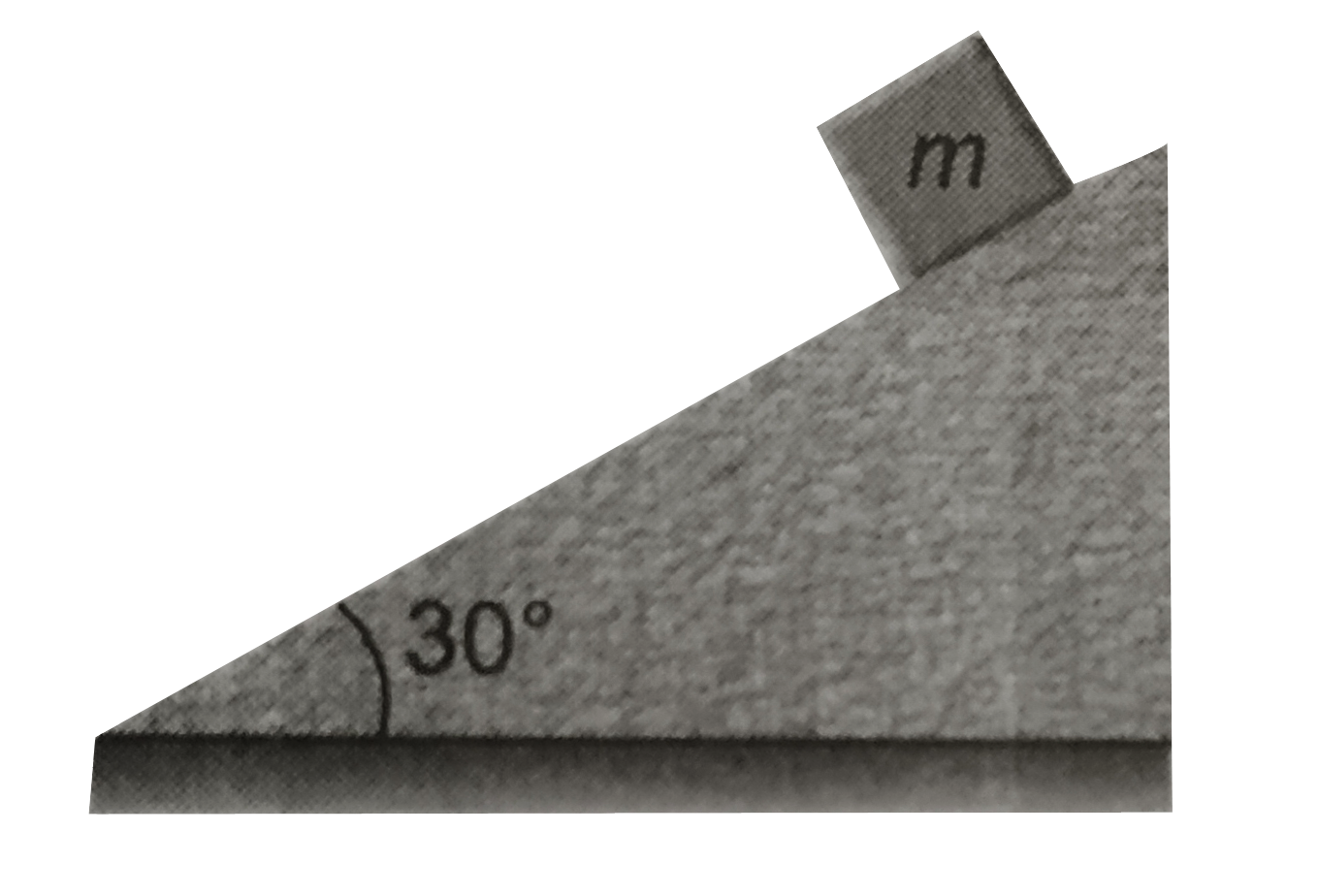
What minimum force is required to move it up the incline with constant speed?
View SolutionA man wants to slide down a block of mass m which is kept on a fixed inclined plane of inclination 30∘ as shown in the figure .Initially the block is not sliding .
To just start sliding the man pushed the block down the inclined with a force F. Now , the block starts accelerating. To move it downwards with conatant speed the man starts pulling the block with same force. Surface are such that ratio of maximum static friction to kinetic friction is 2 Now, answer the following questions.
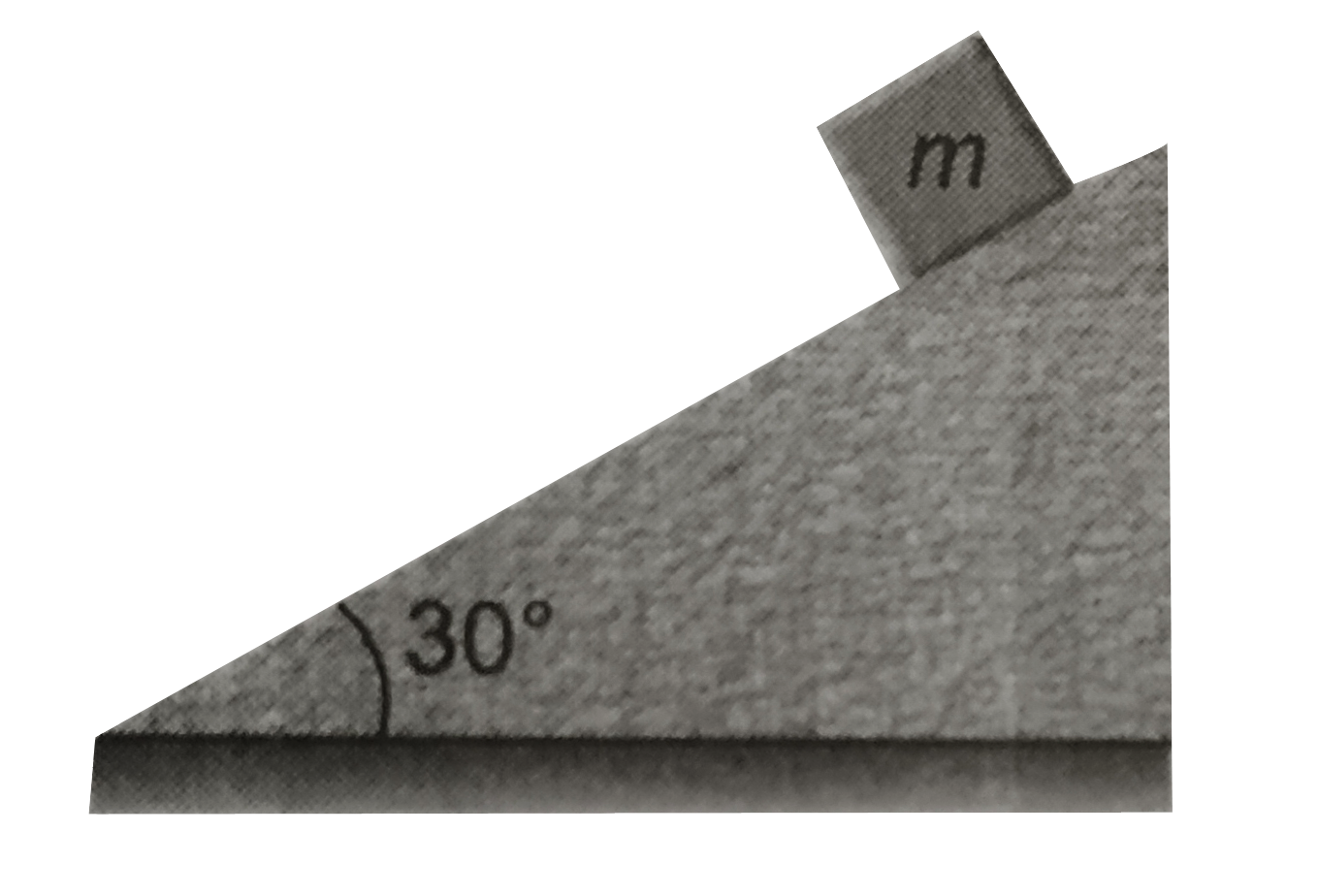
If the man wants to move the block up the inclined , what minimum force is required to start the motion?
View Solution
Knowledge Check
When we apply a horizontal force on a body kept on horizontal floor, a horizontal force starts opposing the net applied force. This force is called frictional force and is always tangential to the contact surface. Frictional force on a moving body is called kinetic friction which is directly proportional to the normal force (fk=μkN) where μk is a constant depending upon the surfaces and is called the coefficient of kinetic friction. Frictional force on a static body is called static friction. Maximum value of static friction force is (fs≤μsN), where μs is coefficient of static friction.
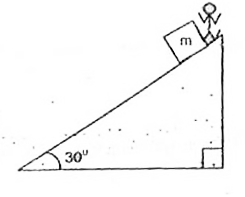
Now a man wants to slide down a block of mass m which is kept on a fixed inclined plane of inclination 30∘ as shown in figure initially, the block is not sliding. To just start sliding the man pushes the block down the inclined with a force F. Now the block starts accelerating. To move it downwards with constant speed, the man starts pulling the block with same force. Surfaces are such that ratio of maximum static friction to kinetic friction is 2. Now, answer the following questions.
What is the value of F?Amg4Bmg6Cmg√34Dmg2√3When we apply a horizontal force on a body kept on horizontal floor, a horizontal force starts opposing the net applied force. This force is called frictional force and is always tangential to the contact surface. Frictional force on a moving body is called kinetic friction which is directly proportional to the normal force (fk=μkN) where μk is a constant depending upon the surfaces and is called the coefficient of kinetic friction. Frictional force on a static body is called static friction. Maximum value of static friction force is (fs≤μsN), where μs is coefficient of static friction.
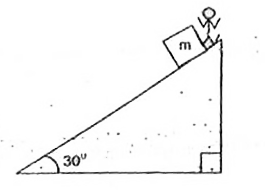
Now a man wants to slide down a block of mass m which is kept on a fixed inclined plane of inclination 30∘ as shown in figure initially, the block is not sliding. To just start sliding the man pushes the block down the inclined with a force F. Now the block starts accelerating. To move it downwards with constant speed, the man starts pulling the block with same force. Surfaces are such that ratio of maximum static friction to kinetic friction is 2. Now, answer the following questions.
What is the value of μs ?A43√3B23√3C33√3D12√3A man wants to slide down a block of mass m which is kept on a fixed inclined plane of inclination 30∘ as shown in the figure .Initially the block is not sliding .
To just start sliding the man pushed the block down the inclined with a force F. Now , the block starts accelerating. To move it downwards with conatant speed the man starts pulling the block with same force. Surface are such that ratio of maximum static friction to kinetic friction is 2 Now, answer the following questions.
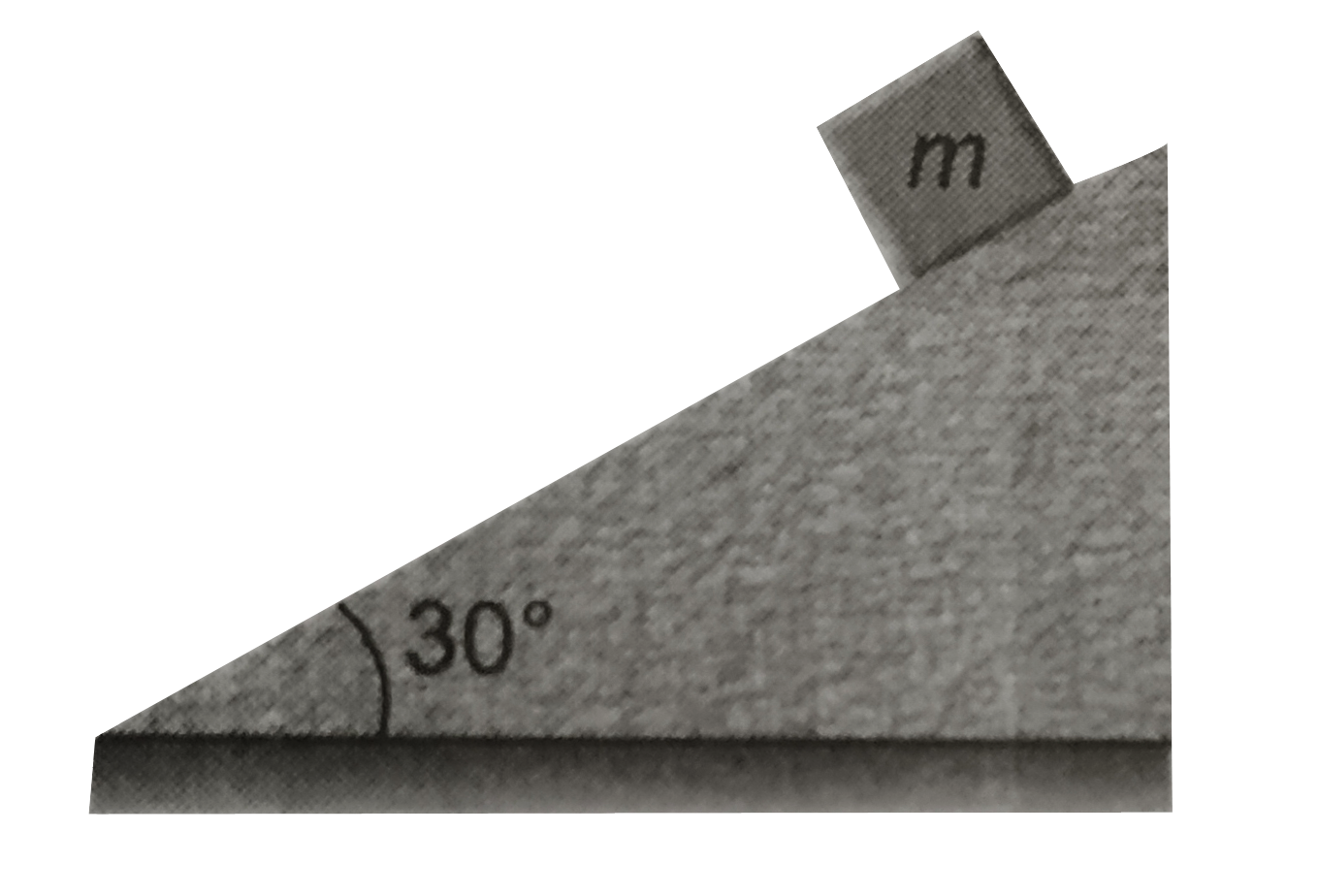
If the man continues pushing the block by force F its acceleration would beAg6Bg4Cg2Dg3
When we apply a horizontal force on a body kept on horizontal floor, a horizontal force starts opposing the net applied force. This force is called frictional force and is always tangential to the contact surface. Frictional force on a moving body is called kinetic friction which is directly proportional to the normal force (fk=μkN) where μk is a constant depending upon the surfaces and is called the coefficient of kinetic friction. Frictional force on a static body is called static friction. Maximum value of static friction force is (fs≤μsN), where μs is coefficient of static friction.
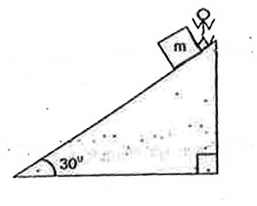
Now a man wants to slide down a block of mass m which is kept on a fixed inclined plane of inclination 30∘ as shown in figure initially, the block is not sliding. To just start sliding the man pushes the block down the inclined with a force F. Now the block starts accelerating. To move it downwards with constant speed, the man starts pulling the block with same force. Surfaces are such that ratio of maximum static friction to kinetic friction is 2. Now, answer the following questions.
If man continues pushing the block by force F, its acceleration would be
View SolutionA block of mas m begins to slide down on an inclined plane of inclination θ. The force of friction will be
View SolutionA block of mass 10 kg is placed on an inclined plane when the angle of inclination is 30∘. The block just begins to slide down the plane. The force of static friction is
View SolutionA block mass 'm' is placed on a frictionless inclined plane of inclination θ with horizontal. The inclined plane is accelerated horizontally so that the block does not slide down. In this situation vertical force exerted by the inclined plane on the block is:
View SolutionA block of mass m slides down an inclined plane of inclination θ with uniform speed The coefficient of friction between the block and the plane is μ. The contact force between the block and the plane is .
View Solution

